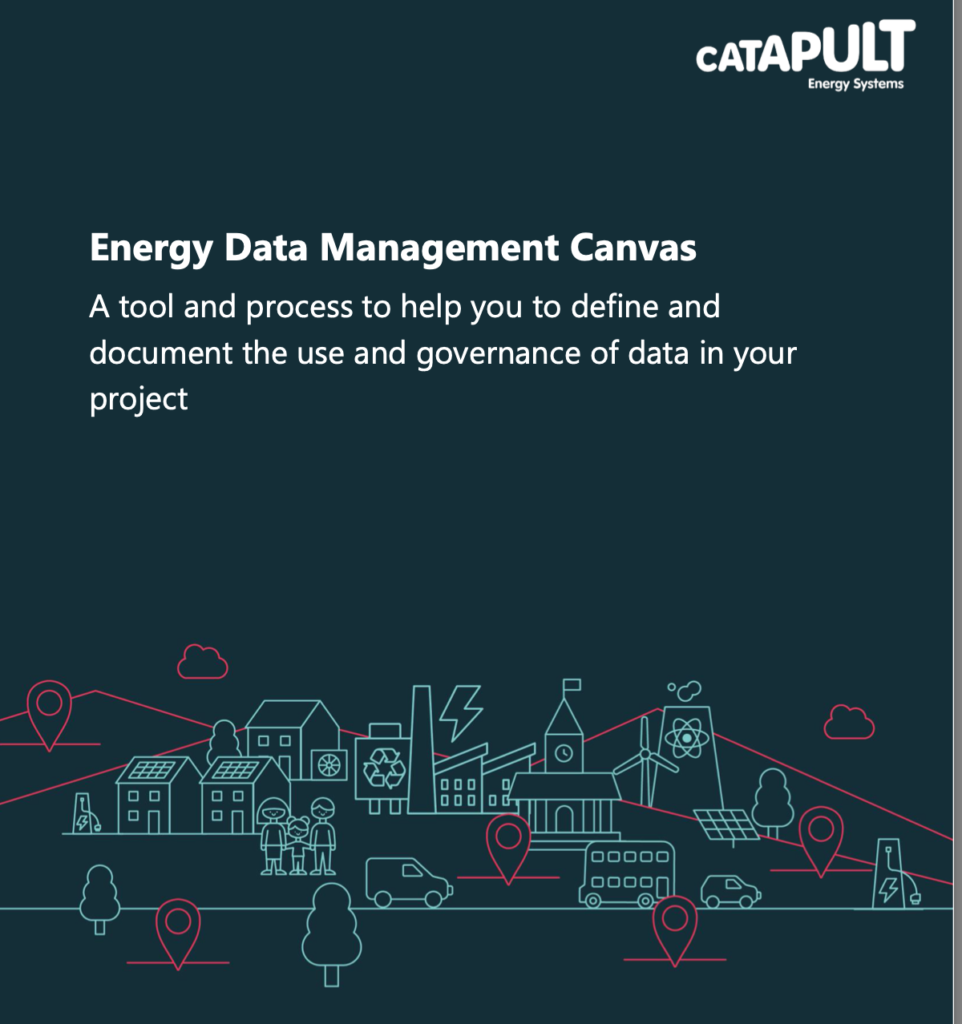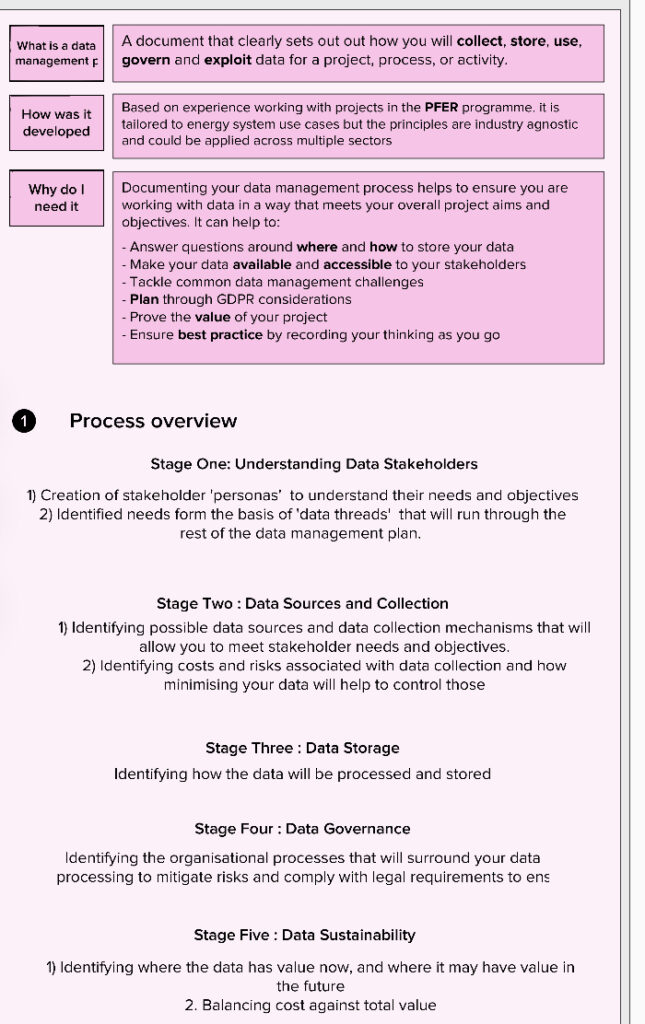The Data Management Canvas has landed.
Understanding, and planning for, the role of data within a project – and the governance challenges that accompany it – can be a difficult process. Consentua worked with the Energy Systems Catapult (ESC) to develop a “data management canvas” for energy generation projects.
Download the canvas here (free to download and requires sign-up): https://es.catapult.org.uk/guide/energy-data-management-canvas/

The canvas was commissioned by the ESC to help local energy generation projects have confidence in their data requirements. It also ensures the resulting data requirements are fit for purpose in terms of their legality, the sustainability of use, and the cost of data acquisition, processing/storage.
Despite the focus on local energy generation projects, it is applicable to any type of ‘smart place & community’ or smart city project. Any project that involves multiple actors, people, and things, driving multiple (and often diverse) outcomes and objectives. This data canvas will be of use.
Why is this required?
Local Energy projects are typically heavy consumers of data from a variety of sources. Be that the energy grid, energy consumption or storage, and finally consumers and citizens. On a small scale, it is easy to request all and any data. However, over time this approach will lead to bloated data sets; data retention when it no longer has a purpose; accusations of big brother mentality from citizens, and ever-decreasing economies of scale as cost outweighs the value.
The canvas design avoids these negative consequences. It gives projects the confidence to describe and own the data that they require and the purpose they need it for.
As a result, projects adopting the canvas will have both the outcome and purposeful data elements identified. A good understanding of the value of this data over time. Plus, they will have a categorisation of the likely costs of processing, storing, and applying this data to the outcomes desired.
Ultimately, the canvas is about helping projects find value, faster with more confidence.
What does the Data Canvas contain?
The data canvas should be viewed as a tool and framework for capturing good data management requirements. It is a technique used by data-intensive projects to ensure they give all data in scope for processing a known life. In essence, it is a method for prescribing a data archiving or data death date on each type of data being processed in a project.
The canvas is a series of questions. The results from one exercise feed into the next.
There are five key sections:
- Understanding Data Stakeholders
- Data Sources and Collection
- Storage of Data
- Governance
- Sustainability
Executed via a series of iterative workshops with stakeholders. With a canvas facilitator driving the workshop outcomes and documenting the results.

Benefits of the Data Canvas?
The benefits of applying the data canvas are multiple. Primarily it is about ensuring that projects that require large volumes of data, (that involve things and people especially), understand what the data from the project is being used for and why.
It is all about understanding the purpose and outcome.
This will therefore lead to:
- Reduce data overload and expense of processing data that has no value or purpose.
- Citizen-centric focus which encapsulates:
- Privacy by design from the outset;
- Purpose-led data requests;
- Legal compliance with GDPR / CCPA;
- Aligns to global Smart City standards and best practice.
- Reduces risk of data leakage and non-compliance
- Removes the fear of personal data abuse and of people being monitored.
Why do we need the data canvas?
The canvas was initiated as it is evident that projects are making the same common errors; be it local energy generation, a digital twin, an IoT, or something to do with people and place. Which is a mix of processing everything with a fear that by not processing the data somehow, something, somewhere will be missed. On the flip side, over-caution from these same types of projects as the purpose and outcomes have not been fully thought through. Or it is due to a fear of a tarnished reputation or the hurdles of compliance meaning the data is ‘left on the table’ and not processed.
Here are some other reasons why the data canvas will help projects pick the right data management approach.
- Our Project is still in its infancy so how can I possibly know what to process?
- The canvas helps capture through the lifecycle of the data journey what could be, what needs to be processed, and why for what purpose to deliver an outcome.
- The tendency is to err on caution.
- The canvas enables projects to be bold in their assertion and justification of data required to be a success.
- Data is not a focus area. But Data underpins the outcome….
- The canvas brings together disparate sources of data and ensures that each data element adds value to the business outcomes. In fact, because new data is being processed, additional business value is likely to be identified.
- Too many actors involved
- The canvas can handle lots of complexity. There are no upper or lower limits on the number of actors or use cases being applied.
- Which Standards to use?
- The canvas has a number of standards driving its ethos.
- This ranges from the Consent Receipt specification from Kantara.
- The ODI Data Ethics Canvas
- Sustainable Smart Places – ISO 37106
- Information Security Management Standards – ISO 27001
- ISO Document Management Standards – ISO 9001
- The canvas has a number of standards driving its ethos.
What benefits does it bring?
Applying the canvas will lead to improved outcomes in the following areas:
- Reduces Cost, Risks, and Data Overhead
- Ensures good data management discipline from the outset
- Helps exploit data as early as possible – data has a purpose
“Using the canvas will reduce risk, saving projects time and money. This is because the canvas covers a topic that will have to be thought through anyhow (i.e. what data I need to process); but the answers it generates are a lot safer, happen quicker, are more joined up and the data identified will have a purpose that aligns with the project’s goals.”
By Chris Cooper – data canvas co-creator
Impact of not using the canvas.
Using this canvas method reduces data creep, keeps an eye on costs and ensures that only the data stored is data used. The flip side, therefore, is that projects not adopting a method advocated by the data management canvas are likely to be prone to:
- Data Creep – that is having too much data being processed and stored versus what is actually required. This can lead to project bloat and an unsustainable cost burden. Especially as the data grows exponentially. Eventually, the technology or cost burden will cause a burst that is detrimental to the health and/or future of the project.
- Poor data management leads to increased risk, especially in the use of personal data. This opens up data controllers to fines and sanctions.
- Consumers/Citizens lose trust and faith. They then do not participate, or when they do, they do not wish to share their personal data. This leads to lower impact and a less successful project outcome.
So in short, using the canvas helps deliver a successful smart project.
How did the canvas come about…
The canvas concept originated in a number of areas. Firstly, a debt of gratitude goes out to Strategizer – Business Model Canvas which is used by startups and innovators. The idea of an iterative process builds a story and outcome.
Secondly, the ODI Data Ethics Canvas focuses on the necessity and purpose of data from an ethical use perspective. This is key as it adds to validating user trust. The greater the trust the more chance that consent to use personal data will be granted. Which leads to…
Thirdly, the need from a personal digital economy perspective to have purposeful, consentful, and outcome-centric data. This is very well articulated by Dr. Richard Gomer (Data canvas co-creator) in the Meaningful Consent Project. This purpose-led consent is now enshrined in Consentua.
Fourth, the ESC as part of the Energy Revolution Integration Service had identified a gap in the capability of projects. This could be fixed with a data canvas that leaned on ethics (as per the ODI) and the iterative build approach of the Business Model Canvas.
During a workshop where the ESC team were present, KnowNow Information (Canvas co-creators) undertook an interactive data discovery workshop for a local energy project on the Isle of Wight. This was an Innovate UK-funded feasibility study, led by the University of Portsmouth. This became the genesis of the Energy Data Canvas.
UoP Research Portal – IoW Energy Community – Demand Response Study
Next Steps / Call to Action
- Schedule a call with Jake at the ESC or David at KnowNow to learn more and book your canvas workshop.
- Download a copy of the canvas: https://es.catapult.org.uk/guide/energy-data-management-canvas/

Trackbacks/Pingbacks